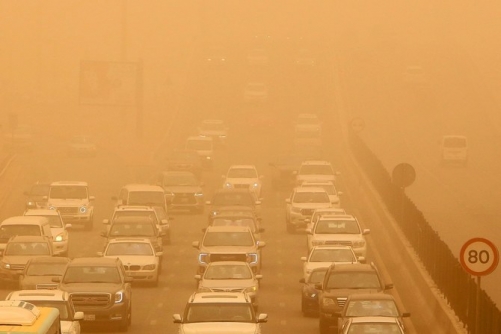Manama faces alarming rise of pollution levels
TDT | Manama
The Daily Tribune – www.newsofbahrain.com
Reported by Zahra Ayaz
Manama has emerged as one of the most heavily polluted cities in the region. Recent reports indicate a troubling average concentration of PM2.5, a measure of fine particulate matter, at 66.6.
Prominent environmentalists have shed light on the primary factors contributing to this crisis. Kai Miethig emphasized the excessive use of motorised vehicles as a major concern. The continuous emission of pollutants from cars into the atmosphere has led to a rapid deterioration in air quality.
“To tackle this pressing issue, immediate measures are crucial. Encouraging alternative modes of transportation, such as walking and cycling, particularly during cooler months, can significantly reduce pollution levels,” Mr. Miethig suggested.
He further advocated for promoting carpooling and car-sharing initiatives to combat traffic congestion and the subsequent increase in air pollution. “The industrial sector also bears responsibility for the alarming pollution levels. Stringent measures must be implemented to regulate and control harmful emissions from industrial facilities,” Mr. Miethig added.
He stressed the installation and enforcement of effective emission filtration systems as a means to minimise the release of pollutants into the air, thereby curbing the adverse impact on air quality.
When asked about the latest technologies that can be adopted to reduce pollution, Mr. Miethig mentioned a range of options, including renewable energy, electric vehicles, energy-efficient technologies, waste-to-energy solutions, air pollution control systems, green building design, carbon capture and storage, smart city solutions, sustainable agriculture, and water treatment technologies.
Initiatives and strategies
Another environmentalist, Teresa Christman, highlighted the Ministry of Sustainable Development’s initiatives as outlined in the Bahrain Voluntary National Review 2023. The ministry has approved the National Water Strategy 2030 and implemented innovative agricultural practices such as greenhouses, hydroponic systems, and modern irrigation technologies.
“Bahrain has made significant progress in water conservation, reducing freshwater withdrawals by a fifth between 2000 and 2021 and increasing water-use efficiency by 80 percent. The country has achieved 100 percent supply coverage, ensuring equitable access to safe and affordable drinking water,” Ms. Christman stated.
She also mentioned the commitment to doubling the original renewable energy targets to 20 percent by 2035, with ongoing projects including a 100-MW solar power plant and a 72-MW initiative to install solar energy systems on government buildings’ rooftops. “We can individually contribute to the reduction of pollution by changing our habits and reducing the amount of waste we produce. For example, say no to single-use utensils, straws, cups, and bags,” she added.
Adverse health effects
Dr. Shamil PK, a specialist pulmonologist at Bahrain Specialist Hospital, emphasised the adverse health effects of early life exposure to air pollution, particularly in children. These effects include infant brain development issues, compromised lung development and function (including paediatric asthma), increased risks of uncontrolled asthma, exacerbation of COPD, and hospitalisation.
Dr. PK recommended individuals with lung or cardiovascular diseases use air filters and facemasks, restrict outdoor activities on days with higher air pollution, and adopt other health-promoting actions such as smoking cessation, vaccinations, and adherence to medical treatment.
Related Posts

